The little machine works better if you click on the ‘nifty’ graphic above. It’s not going automatically for me.
Good Reason
It's okay to be wrong. It's not okay to stay wrong.
Category: foolishness (page 6 of 14)
I complained in an earlier post about religious groups in Haiti jockeying for position so as to mix aid with proselyting (and in some cases, victim blaming).
I didn’t expect them to be carrying off children.
Ten American Baptists sit in a Haitian jail on Monday, accused of child trafficking for what they say was a hastily conceived attempt to rescue orphans by quickly removing them from Haiti — before getting official permission or even checking to determine that the children really were orphans. In Haiti and on the Web, the arrests have led to fresh accusations that some religious groups may be guilty of a kind of spiritual trafficking, by mixing the help they offer to victims of last month’s earthquake with proselytizing.
The Baptists were open about the fact that they felt driven by their Christian faith. Speaking to reporters after the group’s arrest, Laura Silsby, who led the Baptist team to Haiti, described the children as “deeply in need most of all of God’s love and his compassion.” In a description of the mission posted online, the group wrote, “God has laid upon our hearts the need to go now.”
Meanwhile in Idaho, where several of the Baptists are from, Rev. Clint Henry, a pastor involved in the effort, denounced what he called “the accusations of Satan,” made against “our team,” The Associated Press reported.
In other words, anything they do is right, and any efforts to oppose them are from the devil.
Even I wouldn’t have suspected religiously-motivated aid workers of something so self-righteous, misguided, and wrong. But when you’re high on faith, and think a god is directing you, it means there’s no possibility of accountability or negotiation.
But only 33 children? Amateurs!
I’m used to hearing people complain about the language of Them Dern Kids, but this rationale is a new one.
800 words won’t get job done
LONDON: A generation of teenagers risks making itself unemployable because its members are using a vocabulary of only about 800 words a day, according to the British government’s first children’s communication tsar.
Communication tsar? Are they sure she’s not a czar?
I wonder what’s causing the supposed paucity of vocabulary? Could it be the Internet and mobile phones?
The teenagers are avoiding using a broad vocabulary and complex words in favour of the abbreviated “teenspeak” of text messages, social networking sites and internet chat rooms.
Thought so.
Jean Gross, the government’s adviser on childhood language development, is planning a national campaign to prevent children failing in the classroom and the workplace because they cannot express themselves.
“Teenagers are spending more time communicating through electronic media and text messaging, which is short and brief,” she said. “We need to help today’s teenagers understand the difference between their textspeak and the language they need to succeed — 800 words will not get you a job.“
Gee, 800 words doesn’t sound like a lot. Or is it? How many words do most people say? Let’s check.
First, keep in mind that the 800 words claim is about daily vocabulary, not total vocabulary. That is, young people are using the same 800 words over and over again in a typical day. I’m not sure if that’s true, but let’s accept it for now. The question is: how many different words do adults employ in a day?
We’re going to use a dialogue corpus to find out. I’m pulling words from Verbmobil-2, a corpus of appointment scheduling dialogues. But we don’t know many words to use until we know how many words someone speaks in a day. This is a scary prospect, laden with assumptions.
I had a read through the corpus and found that I can read about 250 words out loud in a minute. Of course, in a dialogue you’d only be speaking about half the time unless you’re rude, or a lecturer. (Or, like me, both.) So let’s say I’d rip through 7,500 words in an hour. Most of us spend some time alone or watching TV, so I doubt we’d spend the equivalent of 4 full hours of every day talking. But let’s say 30,000 words as an upper boundary. (I admit this is highly speculative. Stay with me.)
Here I’ve listed the number of word types (different words) for various numbers of word tokens (each separate word we say) in the Verbmobil-2 corpus. If you think you’re more laconic or loquacious, you can adjust your expectations accordingly.
| Word tokens | Word types |
| 10,000 words | 814 types |
| 20,000 words | 1,080 types |
| 30,000 words | 1,342 types |
| 40,000 words | 1,510 types |
So if you’re an adult on the lower end of the talking scale, you’re going to use about 800 different words, over and over. And even if you quadruple the number of words you say, that still won’t quite double the daily vocabulary. Keep in mind that 40,000 words represents hours and hours of transcripts. The fact is, 800 words is quite a lot. Even if teens only use the same 800 words over and over, that’s certainly not a sign that their vocab is sub-standard. That’s just the way word frequencies fall.
———————-
UPDATE: I’ve just discovered this article in USA Today about a study that saw people wearing tape recorders all day long.
Both sexes say about 16,000 words a day, a study in Science magazine says.
…
He and colleagues analyzed conversations recorded from 1998 to 2004 of 396 students in the USA and Mexico, 210 women and 186 men, ages 18-29. The study examined word count, not vocabulary or word use. Pennebaker says two-thirds of participants spoke 11,000 to 25,000 words a day; the average for both sexes was about 16,000.
So there it is. Sixteen thousand words of dialogue would probably be comprised of under 1,000 word types a day, not too far from 800.
———————-
Let’s take a look at another claim in the article.
Ms Gross said her concerns were supported by research by Tony McEnery, a professor of linguistics at Lancaster University, who found in a study that the top 20 words used by teenagers, including “yeah”, “no” and “but”, account for about one-third of the words used.
Twenty words is not a lot. Is it possible that it could account for a third of the total?
Fortunately, we have frequency statistics for many corpora. If we take a look at the top 1000 words from COLT, the Bergen Corpus of London Teenage Language, we can see that the top 20 words account for 35.6 percent, or about a third. (Some words are excluded from this count, but that just means that the real proportion will be a good deal smaller, which makes the teens seem even more erudite.)
Now we head over to this data from the BNC, or the British National Corpus, a large and wide-ranging collection of spoken and written language. Here, the top 20 words account for around 32 percent of the total, or… about a third.
I decided to run a counter over some works of literature. I tried George Orwell’s 1984. Nobody’s going to accuse Orwell of having a tiny vocabulary. But here the top 20 words account for only 33.7 percent of the total. And for Alice’s Adventures in Wonderland by Lewis Carroll, the top 20 words make up, again, 33.1 percent of the total. Somebody better tell Pseudonym Boys that they’ll never get jobs with that kind of vocabulary.
Gross’s claims sound impressive until you break them down. Most people don’t do this because it’s easier to just accept claims that you already believe. But it’s just another way to complain about young people in a way that’s socially acceptable. It’s a shame people try to enlist linguistic data to confirm their prejudices.
———————-
If you want to hear me say about the same thing on the radio, you can listen to last week’s RTRFM interview. For some reason, I was talking pretty fast. I bet I could have clocked 60,000 words per day at that rate.
I’m on about 5/6ths of the way through the stream. Watch out; it starts playing as soon as the page loads.
Two recent stories.
An alleged Muslim tries to kill a Danish cartoonist for depicting Mohammed.
The Irish government enacts a blasphemy law. Why? Because religious beliefs need protection.
I was disappointed in the video of the Pope Attack, but only because I got it wrong: I thought the Pope had attacked someone. You must admit, it would be worth watching. When Popes Attack. Instead, a crazed loony jumped him like a LOLcat on a tree ornament, and he only got his pointy hat knocked to the ground.
That’s okay, but it’s even better when you apply the Benny Hill soundtrack to it. Now that’s comedy gold!
Jokes aside, I can’t condone an attack on an elderly virgin, even from a fellow loon. I want the Pope to disappear as much as anyone, but this kind of thing won’t help. Just as Jason and Freddy will only die when audiences refuse to watch their movies, the Pope will only cease to exist when people stop believing in him. Sorta like Tinkerbell. And I don’t mean the outfit.
Have a listen to the first minute of these YouTube clips.
You’ve seen this one with Tom the Scientologist…
and here’s one with Will the Scientologist.
They’re not new, but I’d never watched them back to back before. Now I’m struck by the similarity between them. No, I don’t mean how embarrassing it is to watch these two idiots blabbering while normal people can only stare in horrified fascination (especially that Scientologists are better qualified to help an accident victim than, say, a paramedic, or that 2 + 2 = 4 only if we agree that it does). And I don’t mean how they both repeat inflated claims made by their church about human potential.
These two share a discourse style that I’ve never seen before. It’s a weird kind of unfocused rambling, but with evangelical intensity. Acronyms appear out of nowhere (KFC?). They start sentences with no idea how to finish them, but they do it with certainty and weird bravado. It makes no sense, but they seem unaware that they’re making no sense.
Is this a style of monologue that they picked up at the Celebrity Centre? because I don’t want any of what they’re having.
Dowsing doesn’t work. Lots of people think they can find water by the use of sticks or wires, but it always falls apart under experimental conditions. It’s the thing people try most often when going for the JREF Million-Dollar Challenge, and the money is still safe.
But why would you go for a million dollars, when you could net a cool couple of million by selling phony bomb dowsers in Iraq?
The small hand-held wand, with a telescopic antenna on a swivel, is being used at hundreds of checkpoints in Iraq. But the device works “on the same principle as a Ouija board” — the power of suggestion — said a retired United States Air Force officer, Lt. Col. Hal Bidlack, who described the wand as nothing more than an explosives divining rod.
Still, the Iraqi government has purchased more than 1,500 of the devices, known as the ADE 651, at costs from $16,500 to $60,000 each. Nearly every police checkpoint, and many Iraqi military checkpoints, have one of the devices, which are now normally used in place of physical inspections of vehicles.
Would you feel happy knowing that someone had given the area a placebo check for explosives?
The US military doesn’t go for the devices, but the Iraqi authorities are sold.
“Whether it’s magic or scientific, what I care about is it detects bombs,” said Maj. Gen. Jehad al-Jabiri, head of the Ministry of the Interior’s General Directorate for Combating Explosives.
Oh, does it? How well does it detect bombs?
The suicide bombers who managed to get two tons of explosives into downtown Baghdad on Oct. 25, killing 155 people and destroying three ministries, had to pass at least one checkpoint where the ADE 651 is typically deployed, judging from surveillance videos released by Baghdad’s provincial governor.
But the True Believers will tell you that the blame lies with the operators, not the device. You have to be
rested, with a steady pulse and body temperature, before using the device.
Water dowsing is a waste of money, but at least it doesn’t kill anyone. This is a dangerous form of insanity.
Dear Sister has sent me another email. It’s a series of images of Jesus; everything from meek-and-mild Jesus praying in the garden, to a modern and distinctly muscular Jesus rolling the stone away from the tomb his own damn self.
But at the end of the email, there’s a rather pointless broadside:
I’m not ashamed.
He is the only one that can save this country and they want him removed from the government.
Our great nation will not stand if we delete HIM from all aspects of our government as the atheists want
Now I don’t know how much of this stuff she believes (or if she just thinks it’s ‘interesting’), but when she sends a message to thirty of my family members telling them that atheists are essentially out to destroy the country, you bet I’m going to respond.
So this is what I sent back.
=-=-=-=-=-=-=-=-=-=
If you want to find out what atheists want, you should ask an atheist.
Hi. I’m an atheist. I can’t speak for all atheists, but I’m going to be presumptutous and try it anyway, based on my thoughts and my conversations with other atheists.
First off, there’s this thing in the U.S. Constitution called the ‘Establihment Clause’. It says:
Congress shall make no law respecting an establishment of religion, or prohibiting the free exercise thereof
That means that you can practice whatever religion you want (including no religion), but the government isn’t allowed to promote one religion over another.
We atheists think that the Founders meant that. They had every opportunity to write religion into the Constitution, and they chose not to. It’s not about removing Jesus from the government — the guy was never there in the first place.
Another thing. We atheists have noticed that lots of Christians are on the more conservative side, and lots of conservatives think the government isn’t very good at doing things. So we wonder why you want the government to handle the teaching of religion, instead of having churches doing it like usual. And which version of Christianity would the government be promoting? There are a lot of Catholics, but I don’t imagine that Protestants would be thrilled to have the government promote Catholicism. But which Protestant variety? Would Methodists get shut out, or would Baptists? How would Mormons feel to have some other religion get pushed by the government? Of all the sects and creeds that exist, do you really think that you’d be lucky enough to have the government promote your specific variety? We think you probably haven’t really thought this through.
We atheists wonder how exactly you think Jesus will save the nation. Perhaps wearing a cape and tights? We know about Christianity — many of us have been Christians — and we’ve noticed that you folks don’t act any better than we do, and often a good deal worse. So we don’t see exactly why it would be a good thing to make the government more Jesusy. Don’t get us wrong, you’re a lovely bunch of people, but we’ve noticed that your religion has a tendency to make people act in ways that are homophobic, sexually repressed, authoritarian, anti-intellectual, anti-science, anti-education, paranoid, fantasy-prone, and in some cases just plain crazy. Also a lot of you have an unhealthy fascination with other people’s sex lives. And the fact that people like that want control of the government scares the bejabbers out of us.
Finally, we don’t want to delete, erase, or outlaw your beliefs. You can go ahead and express your religious faith however you want in your homes, families, and church groups. After all, we don’t like people telling us what to believe any more than you do, which is why we don’t send out missionaries.
But does Jesus (if he’s still out there) really need all of you to email and legislate on his behalf? You may not be ashamed of him, but you sure don’t seem to have much confidence in his ability to look after himself.
Dear Sister has sent me this email again, so she must be trying to convey something. It’s one of those glurgy stories where the wily student turns the tables on the Atheist Professor.
Aah, the college professor. I don’t know why people love to bash on them. Maybe they got bad grades in college. Or possibly they had their faith challenged by someone smart and it frightened them. Now they’re hostile to Book Larnin’. Or perhaps there’s this malaise among some religious people, like science is making great strides in understanding the world and the universe, and they’re just stuck there in church like every other week, sucking in the vacuity. They understand that science and reason is in opposition to their god (which is why they warn each other to be cautious about it), but they can’t figure out what to do about it, and it’s frustrating. They could take on the problem, but that might be hard. It’s so much easier to forward an email instead.
Goodness knows this is all I ever do in class — argue with students about god — especially because we aren’t busy doing any actual course material. I’ve got free time to burn, which is why I often take the opportunity to belittle my students about their religious beliefs. And they love it — it’s why they worship lecturers like gods, and immediately take on their slightest opinions.
The actual email is very long and boring, so I’m putting it below the jump, with my comments.
Subject: Science vs God…Very interesting
Long, but lively and stimulating:) & WONDERFUL
Science vs God…Very interesting“Let me explain the problem science has with Jesus Christ.” The atheist professor of philosophy pauses before his class and then asks one of his new students to stand.
I start every lecture this way, except I’m plunging a dagger into a teddy bear. But I’m always very careful to make sure there are no Marines in my class. One time I challenged a god to knock me over. It didn’t go well.
“You’re a Christian, aren’t you, son?”
Yes sir,” the student says.“So you believe in God?”
“Absolutely.”“Is God good?”
“Sure! God’s good.”“Is God all-powerful? Can God do anything?”
“Yes.”“Are you good or evil?”
“The Bible says I’m evil.”
Imagine that your holiest book, what you consider to be the source of all divine knowledge, tells you you’re evil. That’s quite the head trip.
The professor grins knowingly. “Aha! The Bible!” He considers for a moment.
“Here’s one for you. Let’s say there’s a sick person over here and you can cure him. You can do it. Would you help him? Would you try?”
“Yes sir, I would.”
“So you’re good…!”
“I wouldn’t say that.”
“But why not say that? You’d help a sick and maimed person if you could.
Most of us would if we could. But God doesn’t..”
The student does not answer, so the professor continues. “He doesn’t, does he? My brother was a Christian who died of cancer, even though he prayed to Jesus to heal him. How is this Jesus good? Hmmm? Can you answer that one?”The student remains silent.
“No, you can’t, can you?” the professor says. He takes a sip of water from a glass on his desk to give the student time to relax.
No, he can’t, can he? Ability implies responsibility. Any of us would help, because we’re good moral beings. But the god of the apologists fails to do so because it would somehow render our existence meaningless, or something.
“Let’s start again, young fella, is God good?”
“Er…yes,” the student says.“Is Satan good?”
The student doesn’t hesitate on this one. “No.”“Then where does Satan come from?”
The student : “From…God…”“That’s right. God made Satan, didn’t he? Tell me, son. Is there evil in this world?”
“Yes, sir.”“Evil’s everywhere, isn’t it? And God did make everything, correct?”
“Yes.”“So who created evil?” The professor continued, “If God created everything, then God created evil, since evil exists, and according to the principle that our works define who we are, then God is evil.”
Without allowing the student to answer, the professor continues: “Is there sickness? Immorality? Hatred? Ugliness? All these terrible things, do they exist in this world?”
The student: “Yes.”“So who created them?”
The student does not answer again, so the professor repeats his question. “Who created them? There is still no answer. Suddenly the lecturer breaks away to pace in front of the classroom. The class is mesmerized.
I’m mesmerised myself, but then what do I know? I thought that theodicy meant ‘theological idiocy’. Actually, maybe I’m not far wrong.
“Tell me,” he continues onto another student. “Do you believe in Jesus Christ, son?”
The student’s voice is confident: “Yes, professor, I do.”The old man stops pacing. “Science says you have five senses you use to identify and observe the world around you. Have you ever seen Jesus?”
“No sir. I’ve never seen Him”“Then tell us if you’ve ever heard your Jesus?”
“No, sir, I have not.”“Have you ever actually felt your Jesus, tasted your Jesus or smelt your Jesus? Have you ever had any sensory perception of Jesus Christ, or God for that matter?”
“No, sir, I’m afraid I haven’t.”
Never smelt your Jesus? What kind of Christian are you? Or is that some kind of bizarre euphemism?
“Yet you still believe in him?”
“Yes.”“According to the rules of empirical, testable, demonstrable protocol, science says your God doesn’t exist. What do you say to that, son?”
“Nothing,” the student replies. “I only have my faith.”“Yes, faith,” the professor repeats. “And that is the problem science has with God.
There is no evidence, only faith.”
So far, so good.
The student stands quietly for a moment, before asking a question of his own.
“Professor, is there such thing as heat?”
“Yes,” the professor replies. “There’s heat.”“And is there such a thing as cold? asked the student.
“Yes, son, there’s cold too.”“No sir, there isn’t.”
The professor turns to face the student, obviously interested. The room suddenly becomes very quiet.
The student begins to explain.“You can have lots of heat, even more heat, super-heat, mega-heat, unlimited heat, white heat, a little heat or no heat, but we don’t have anything called ‘cold’. We can hit up to 458 degrees below zero, which is no heat, but we can’t go any further after that. There is no such thing as cold; otherwise we would be able to go colder than the lowest -458 degrees. Everybody or object is susceptible to study when it has or transmits energy, and heat is what makes a body or matter have or transmit energy. Absolute zero (-458 F) is the total absence of heat. You see, sir, cold is only a word we use to describe the absence of heat. We cannot measure cold. Heat we can measure in thermal units because heat is energy. Cold is not the opposite of heat, sir, just the absence of it.”
Silence across the room. A pen drops somewhere in the classroom, sounding like a hammer.
Why do they always write the professor like he’s a dumbass? I knew this one and I’m in linguistics, for criminy. (And just for the record, absolute zero is −459.67° F, but it’s hard to remember the details in a debate.)
“What about darkness, professor. Is there such a thing as darkness?”
“Yes,” the professor replies without hesitation. “What is night if it isn’t darkness?”“You’re wrong again, sir. Darkness is not something; it is the absence of something. You can have low light, normal light, bright light, flashing light, but if you have no light constantly you have nothing and it’s called darkness, isn’t it? That’s the meaning we use to define the word. In reality, darkness isn’t. If it were, you would be able to make darkness darker, wouldn’t you?”
So what? He’s a professor of philosophy, not physics — cut him some slack.
The professor begins to smile at the student in front of him. This will be a good semester. “So what point are you making, young man?”
“Yes, professor. My point is, your philosophical premise is flawed to start with, and so your conclusion must also be flawed.” The professor’s face cannot hide his surprise this time. “Flawed? Can you explain how?”
“You are working on the premise of duality,” the student explains.. “You argue that there is life and then there’s death; a good God and a bad God. You are viewing the concept of God as something finite, something we can measure. Sir, science can’t even explain a thought.
And religion can? If anything is going to explain thought, it’ll be neuroscience and not revelation.
It uses electricity and magnetism, but has never seen, much less fully understood either one.. To view death as the opposite of life is to be ignorant of the fact that death cannot exist as a substantive thing. Death is not the opposite of life, just the absence of it.”
He’s a monist? Would many Christians agree with this? I thought Satan was necessary to keep the heat off of god for doing all those rotten things. As in “Oh, it’s not god’s fault. It’s his patsy, Satan.” Maybe a Christadelphian wrote this.
Just so I don’t lose track, let’s keep a list of things that do not exist:
Cold
Darkness
Evil
Death
Notice also that, since the previous student admitted that he was evil, he technically doesn’t exist.
“Now tell me, professor. Do you teach your students that they evolved from a monkey?”
“If you are referring to the natural evolutionary process, young man, yes, of course I do”
Of course he does. We’ve already established that he’s obnoxious and evil. Why wouldn’t he be pro-evolution?
“Have you ever observed evolution with your own eyes, sir?”
The professor begins to shake his head, still smiling, as he realizes where the argument is going. A very good semester, indeed.
Yes, you can observe evolution with your own eyes. Evolution has been observed in the lab.
“Since no one has ever observed the process of evolution at work and cannot even prove that this process is an on-going endeavor, are you not teaching your opinion, sir? Are you now not a just scientist, but a also a preacher?”
No.
The class is in uproar. The student remains silent until the commotion has subsided.
“To continue the point you were making earlier to the other student, let me give you an example of what I mean.”
The student looks around the room. “Is there anyone in the class who has ever seen the professor’s brain?”
The class breaks out into laughter.“Is there anyone here who has ever heard the professor’s brain, felt the professor’s brain, touched or smelled the professor’s brain? No one appears to have done so. So, according to the established rules of empirical, stable, demonstrable protocol, science says that you have no brain, with all due respect, sir. So if science says you have no brain, how can we trust your lectures, sir?”
Now the room is silent. The professor just stares at the student, his face unreadable.
Finally, after what seems an eternity, the old man answers. “I guess you’ll have to take them on faith.”
Now the story has reached the pinnacle of dumbth. Which is not a thing; it is merely the absence of smartness.
If you’re not sure if there’s a brain in your head, I can reassure you: it’s very likely that you do. It’s not something you have to take on faith.
a. If you dissect a cadaver, you will observe a brain inside. You can repeat this experiment as many times as you like, for as many cadavers as you can find. We can then generalise to other humans, thus: humans have brains.
b. We can infer the existence of your brain by observing your behaviours. You can talk, breathe, move, and see. These are things that brains do. We know this because when people’s brains are damaged, they stop doing these things.
c. Some kinds of brain surgery have to be done when the patient is awake. If you have this kind of surgery, you can see your brain with the help of a couple of mirrors.
d. If you’re really not sure, come see me and I’ll get the band saw for some old school trepanation. I can guarantee that it won’t kill you because (as we’ve seen) death doesn’t exist. It’s just a word we use to describe your soon-to-be absence of life.
I’ve noticed a pattern when arguing with Christians. Their reliance on evidence is really selective. If you make a point, it’ll take extraordinary evidence for them to believe it. You could bring them all the evidence you like, and they still probably won’t believe you — as long as it’s something they don’t want to believe. But when they want to believe something, then they can be convinced by the merest hint of a possibility that it might be true. In fact, all they need to do is find out that an alternative belief might have a slight gap in it, and it sends them scampering back to whatever they want to believe, where it’s safe.
“Now, you accept that there is faith, and, in fact, faith exists with life,” the student continues. “Now, sir, is there such a thing as evil?”
Now uncertain, the professor responds, “Of course, there is. We see it every day. It is in the daily example of man’s inhumanity to man. It is in the multitude of crime and violence everywhere in the world. These manifestations are nothing else but evil.”
To this the student replied, “Evil does not exist sir, or at least it does not exist unto itself. Evil is simply the absence of God. It is just like darkness and cold, a word that man has created to describe the absence of God.
Why isn’t God just a word that man has created to describe the absence of evil? Apparently it only works one way.
God did not create evil. Evil is the result of what happens when man does not have God’s love present in his heart. It’s like the cold that comes when there is no heat or the darkness that comes when there is no light.”
The professor sat down.
On a whoopie cushion.
Pass this on if you have faith.
In summary, no one has seen the professor’s brain, therefore everything has to be taken on faith, including evolution. Science is just as poor a way of thinking as faith is, which presupposes that faith isn’t a good way of thinking. Cold isn’t an actual thing, and therefore God’s off the hook for any evil happening around the place because apparently evil and death don’t exist, although God somehow does.
Clear?
From the Department of Ersatz Relics, a new development:
The Shroud of Turin has been reproduced by an Italian scientist in another attempt to prove that the cloth bearing an image of Christ’s face is a fake.
A professor of organic chemistry at the University of Pavia said he had used materials and techniques that were available in the Middle Ages.
These included applying pigment to cloth and then heating it in an oven.
Tests 20 years ago dated the fabric to between 1260 and 1390, but believers say it is an authentic image of Christ.
This reminds me of 1991, when two men revealed that they were responsible for making all those crop circles. If anyone doubted them, they went ahead and demonstrated how they’d done it, using ropes and boards. By showing how they could have faked the crop circles, they essentially discredited the alien hypothesis in the minds of most people. Occam’s Razor and all that.
If anyone still believes that the shroud is authentic, I suppose this won’t convince them. But now it’s been shown that it dates to no earlier than medieval times, and could have been made with the technology of that time. Occam’s Razor suggests that this is the most likely scenario.
h/t to Jessica
© 2025 Good Reason
Theme by Anders Noren — Up ↑
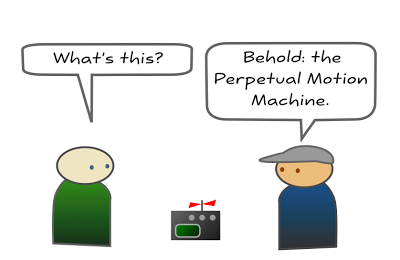

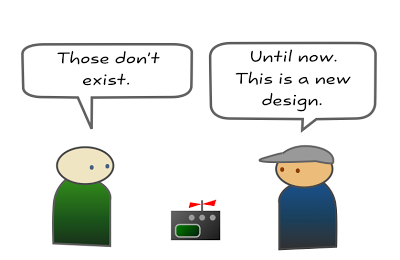
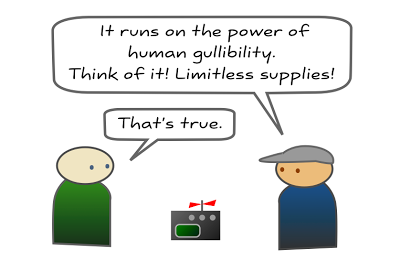
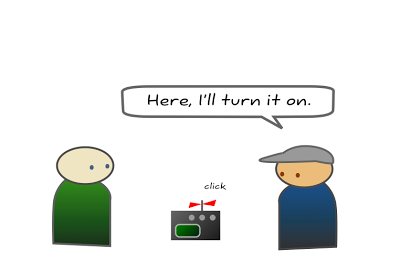
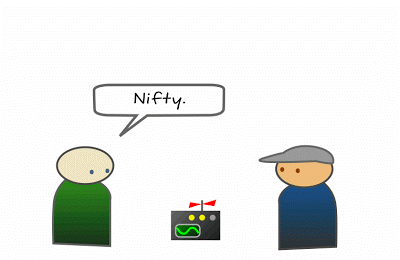

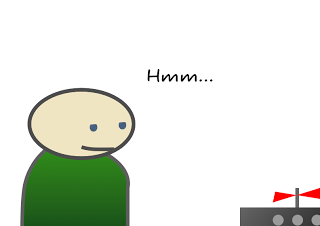

Recent Comments